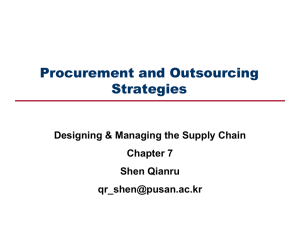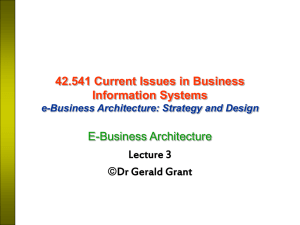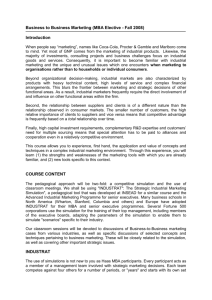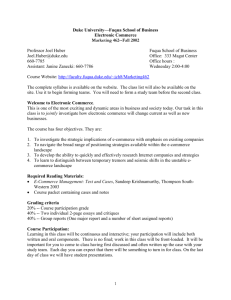FreeMarkets Online Case
advertisement
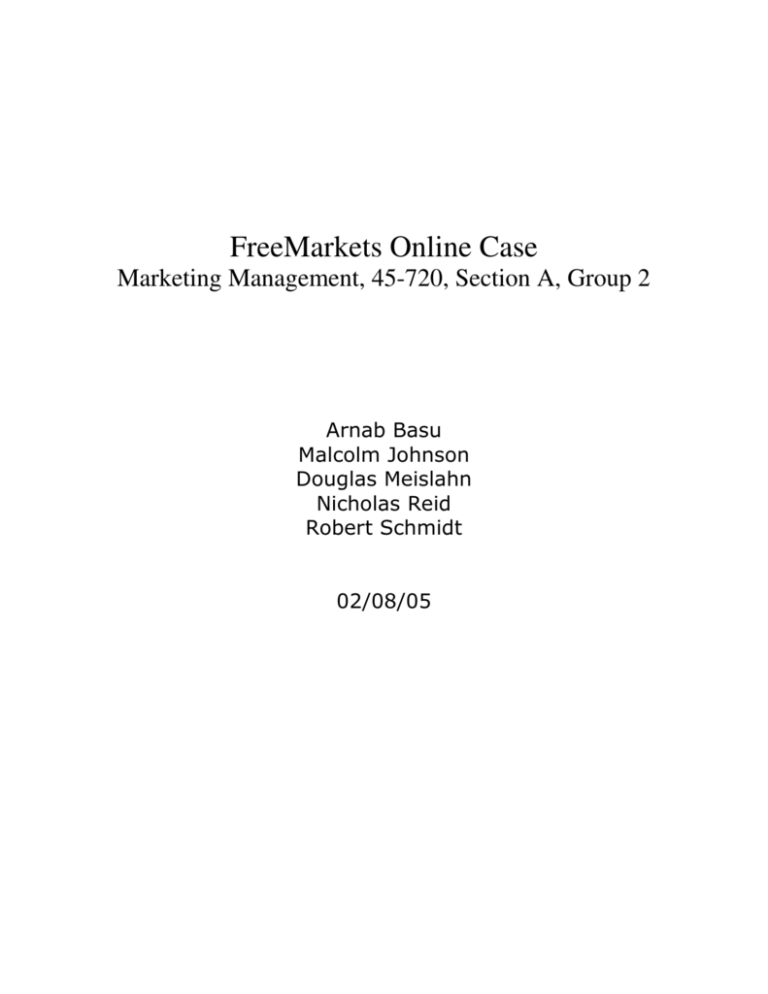
FreeMarkets Online Case Marketing Management, 45-720, Section A, Group 2 Arnab Basu Malcolm Johnson Douglas Meislahn Nicholas Reid Robert Schmidt 02/08/05 Marketing Management, 45-720, Section A FreeMarkets Online Case A. Basu, M. Johnson, D. Meislahn, N. Reid, R. Schmidt Executive Summary FreeMarkets Online is faced with developing a strategy that will increase revenues from $1.8 in 1997 to $6 million in 1998. To accomplish this tripling of their revenue streams, FreeMarkets Online should pursue vertical market dominance by emphasizing its core competencies and shunning any dilution of its product. To this end, the company should focus on the target markets that originally attracted its founders. Also, the unique technology and salable information owned by the company should be guarded, thereby maintaining the value of FreeMarkets Online’s market making abilities. Problem Statement The central issue faced by senior management at FreeMarkets Online pertains to the future positioning and strategic direction of the company as they enter the new year. In particular, FreeMarkets Online management must decide which strategic opportunities they wish to pursue in order to achieve the revenue goals of $6 million in 1998 over the $1.8 million earned in 1997. These opportunities include both vertical and horizontal market expansion, technology licensing, and networked purchasing information systems. FreeMarkets Online management must ascertain how to best leverage such factors as their current competitive advantages, value proposition, and pricing and technological strategies in order to determine the most profitable and successful strategic direction for the company in the coming year. Solution Alternatives & Analysis FreeMarkets Online is faced with key strategic decisions vital to the company’s direction. The first is how to deal with their target market. FreeMarkets Online can pursue vertical market dominance in their current target market, or they can expand the borders of their target market Marketing Management, 45-720, Section A FreeMarkets Online Case A. Basu, M. Johnson, D. Meislahn, N. Reid, R. Schmidt through horizontal market expansion. The company initially chose its target market based on the fact that out of the $600 billion market for industrial intermediate purchasing a full $300 billion consists of components that fall short of commodity status, but make up large orders and have significant demand and competition. Other advantages to FreeMarkets Online’s current market space include: • a high rate of repeat customers • current team of market makers are very efficient operating in this space (currently doing less than 1.2 CBEs per month on average compared to a capacity of 4 CBEs per month) • established familiarity of current base of suppliers to FreeMarkets Online’s service • they have 3 years of feedback from customers in this industrial purchasing market While expanding into other purchasing needs presents the opportunity for new revenue streams, there remains enormous potential inside the current $300 billion target market. A tighter focus also lends towards creating a brand identity and the kind of word-of-mouth buzz that surrounds a new service bringing substantial cost-savings. Also, a successful attempt at vertical market dominance dramatically lessens the threat of competitive attack. The next set of decisions facing FreeMarkets Online deals with new ways to release their technology to open up new sources of revenue. One such option is to license the bidding technology for use by individual buyers. However, such an option fails to take into account the fact that FreeMarkets Online is not in the business of selling technology, but rather a service in which technology only plays the role of bringing buyers and suppliers together. Without FreeMarkets Online to ensure the market making activities surrounding the technology are properly implemented (which is at the core of the value FreeMarkets Online provides), there could be massive failures in the execution of the bidding events. Another suggested option was Marketing Management, 45-720, Section A FreeMarkets Online Case A. Basu, M. Johnson, D. Meislahn, N. Reid, R. Schmidt to change the way the current service was sold, such as eliminating commissions. This would push FreeMarkets Online to a fee-only pricing strategy. In order to make up for the lost revenue, FreeMarkets could raise their fees dramatically. However, given that commissions are typically paid to traditional manufacturer reps, the commissions are not only a familiar model, they are another way to emphasize FreeMarkets Online’s cost-effectiveness, with their commissions typically being half the industry standard. Also, they represent a more equitable approach to pricing since many contracts have annual renewal clauses that change the actual amount of supplies shipped. Finally, the company faced the choice to begin selling other industrial purchasing related services. One such service suggested was a web-based purchasing information service based off of FreeMarkets Online’s data from its past client engagements. However, this is not a corecompetency for FreeMarkets Online and could prove severely detrimental to their core service. Part of FreeMarkets Online’s value-adding proposition is that they bring together companies out of a huge network of buyers and suppliers that often have no previous knowledge of one another. While making information about things such as low-cost suppliers available will create some short-term revenue, it could severely undermine FreeMarkets Online’s principal market making activities. Future revenue streams could be negatively impacted if buyers decided that rather than a full-scale market making engagement, they only needed some key industrial purchasing information. Recommendation Our recommendation is that FreeMarkets Online leverage their current competencies and competitive advantages to first increase their vertical market dominance. This will reduce their risk of market base loss due to competitive encroachment and will provide a springboard for Marketing Management, 45-720, Section A FreeMarkets Online Case A. Basu, M. Johnson, D. Meislahn, N. Reid, R. Schmidt future horizontal expansion. Further, FreeMarkets Online should not license their technology for use by buyers and 3rd parties. The potential for misuse of the technology, coupled with the loss of the value of FreeMarkets Online’s market making activities, increases the risk of limited returns for both buyers and suppliers. Likewise, FreeMarkets Online should avoid entering the business of networked purchasing information systems. This is not a core competency of the company, and the licensing of data decreases the value of FreeMarkets Online’s market making services. Rather, FreeMarkets Online should continue focusing on their large target market base and attempt to vertically strengthen their market position. This will lead to a sustainable competitive advantage that may be leveraged to take advantage of future opportunities.

